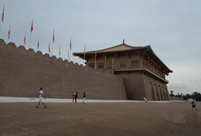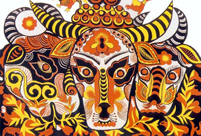 In pics: YOG prism
In pics: YOG prism
 Amputee girl reaches top of half-left tower in Jiangxi
Amputee girl reaches top of half-left tower in Jiangxi
 Yardangs in Lop Nur
Yardangs in Lop Nur
 Intoxicating Ayding Lake in Xinjiang
Intoxicating Ayding Lake in Xinjiang
 Beijing's MJ impersonator a 'thriller' for crowds
Beijing's MJ impersonator a 'thriller' for crowds
 Armed police compete on the plateau
Armed police compete on the plateau
 Rubber Duck settles in Guiyang new urban area
Rubber Duck settles in Guiyang new urban area
 Rare set of giant panda triplets turn one month old
Rare set of giant panda triplets turn one month old
 Closing ceremony of Youth Olympic Games
Closing ceremony of Youth Olympic Games
 Attractive posters to welcome freshmen
Attractive posters to welcome freshmen
BEIJING, Aug. 29 -- Four terminally ill patients in Beijing have reclaimed their lives after receiving a lung, a liver and two kidneys donated by a woman who died of a cerebral hemorrhage earlier this month.
The operations brought the tally of liver and kidney transplants performed at Beijing Chaoyang Hospital since last year to seven and 14 respectively, said Zhang Xiaodong, a senior urologist at the prominent hospital.
"None of the organs used for these transplants were obtained from the court," said Zhang, referring to organ harvesting from executed prisoners, a decades-long controversial practice in China to ease demand for organs.
Zhang, who is also deputy secretary general of China Scientific Registry of Kidney Transplantation, said voluntary organ donation has mushroomed in the country since the government started vigorously promoting the cause four years ago.
Figures provided by Zhang show that in 2009, Chinese hospitals carried out over 6,700 kidney transplants, with more than 50 percent of the organs from death row inmates, only 0.04 percent from voluntary donors and the remaining from living donors who are usually recipients' family members.
However, in the first five months this year, the proportion of donated kidneys used for transplants surged to 30 percent, about the same ratio with kidneys from prisoners, he said.
STANDARDIZED SYSTEM
China piloted voluntary organ donation programs in parts of the country in 2010 and made it a nationwide program in 2013, in order to cut down reliance on prisoner organs and expand ethical sources.
As of mid-August, the programs had seen more than 5,700 organs donated by 2,100 ordinary citizens after death nationwide, said Huang Jiefu, former vice minister of health who leads the country's organ donation and transplant reform, at a forum on development and regulation of organ procurement organization (OPO).
The number of volunteers who completed the donation shot up to 849 in 2013 from 34 in 2010, and reached 659 since this year, according to the National Health and Family Planning Commission.
Under the program, OPOs are empowered to extract organs, licensed hospitals can perform transplant surgery and the non-governmental Red Cross Society (RCS) and its local branches are responsible for donation publicity, registry and supervision.
In addition, the government has mandated the use of a computerized system to automatically distribute donated organs based on candidates' location, degree of emergency and compatibility with the organs, for the sake of fairness and transparency.
Before the system was employed in 2011, recipients were largely determined by hospitals. It resulted in rare organs sometimes going to deep-pocketed patients rather than those in the most dire need.
In 2012, China vowed to scrap organ harvesting from executed prisoners within three to five years, even if the country faces an acute shortage of organs. An average of 300,000 patients are waitlisted for transplants a year, but only 10,000 get their wish each year.
 |
 Models with two-dimensional codes painted on bodies
Models with two-dimensional codes painted on bodies Antique exhibition of Maritime Silk Road held in Jinan
Antique exhibition of Maritime Silk Road held in Jinan NASA releases images of solar flare
NASA releases images of solar flare Daming Palace in Chang’an City in photos
Daming Palace in Chang’an City in photos Babies of celebrities born in the year of horse
Babies of celebrities born in the year of horse Farmer Painting, one of Ansai's Three Strange Wonders
Farmer Painting, one of Ansai's Three Strange Wonders Special holidays
Special holidays World's top 10 fighters
World's top 10 fighters 'Stewardesses' serve in hospital
'Stewardesses' serve in hospital The biggest duty-free store of the world
The biggest duty-free store of the world Volunteers bid farewell to YOG
Volunteers bid farewell to YOG More police dogs join anti-terror campaign in Inner Mongolia
More police dogs join anti-terror campaign in Inner Mongolia Picturesque Dayilan Manchu village in NE China
Picturesque Dayilan Manchu village in NE China Athletes experience the charm of Chinese traditional opera in Nanjing
Athletes experience the charm of Chinese traditional opera in Nanjing Contestants for Miss Bikini World experience Chinese traditional culture
Contestants for Miss Bikini World experience Chinese traditional cultureDay|Week|Month